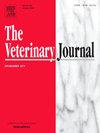Antitumor effects of inhibitors of ERK and Akt pathways in canine histiocytic sarcoma cell lines
IF 3.1
2区 农林科学
Q1 VETERINARY SCIENCES
引用次数: 0
Abstract
Canine histiocytic sarcoma (CHS) is characterized by aggressive biological behavior. In our previous study, ERK and Akt pathways were found to be activated in CHS tissues. Thus, the objective of this study was set to investigate the relationships between the activation status of these pathways and the proliferation of CHS cell lines by examining the effects of single and co-administrations of drugs targeting these pathways. First, we evaluated the changes in cell proliferations and the activations of ERK and Akt pathways after treatments with ERK and Akt-specific inhibitors in CHS cells. Then, these changes after treatments with dasatinib and trametinib were also examined in CHS cells. Inhibitors specific to ERK and Akt pathways successfully inhibited the respective pathways in CHS cell lines. It was also indicated that these pathways were associated with the regulations of proliferations of CHS cells, although the anti-proliferative effect was not necessarily observed by inhibition of Akt pathway alone. Dasatinib and trametinib also showed the inhibitions of Akt and ERK pathway activations, respectively, in CHS cells. However, the anti-proliferative effects of these drugs varied among CHS cell lines, and co-administration showed enhanced anti-proliferative effects in only a part of CHS cell lines. Further studies are needed to investigate the molecular mechanisms associated with the sensitivities to these molecular-targeted drugs in CHS cells.
ERK和Akt通路抑制剂在犬组织细胞肉瘤细胞系中的抗肿瘤作用。
犬组织细胞肉瘤(CHS)具有侵袭性生物行为的特点。我们之前的研究发现,ERK 和 Akt 通路在 CHS 组织中被激活。因此,本研究的目的是通过研究单一或联合使用针对这些通路的药物的效果,来探讨这些通路的激活状态与 CHS 细胞系增殖之间的关系。首先,我们评估了ERK和Akt特异性抑制剂处理CHS细胞后细胞增殖的变化以及ERK和Akt通路的激活情况。然后,我们还在CHS细胞中检测了达沙替尼和曲美替尼治疗后的这些变化。ERK和Akt通路特异性抑制剂成功地抑制了CHS细胞系中的相应通路。研究还表明,这些通路与 CHS 细胞的增殖调控有关,尽管仅抑制 Akt 通路并不一定能观察到抗增殖效应。达沙替尼和曲美替尼也分别抑制了Akt和ERK通路在CHS细胞中的激活。然而,这些药物的抗增殖作用在不同的CHS细胞系中存在差异,联合用药仅在部分CHS细胞系中显示出更强的抗增殖作用。还需要进一步研究这些分子靶向药物对CHS细胞敏感性的相关分子机制。
本文章由计算机程序翻译,如有差异,请以英文原文为准。
求助全文
约1分钟内获得全文
求助全文
来源期刊

Veterinary journal
农林科学-兽医学
CiteScore
4.10
自引率
4.50%
发文量
79
审稿时长
40 days
期刊介绍:
The Veterinary Journal (established 1875) publishes worldwide contributions on all aspects of veterinary science and its related subjects. It provides regular book reviews and a short communications section. The journal regularly commissions topical reviews and commentaries on features of major importance. Research areas include infectious diseases, applied biochemistry, parasitology, endocrinology, microbiology, immunology, pathology, pharmacology, physiology, molecular biology, immunogenetics, surgery, ophthalmology, dermatology and oncology.
 求助内容:
求助内容: 应助结果提醒方式:
应助结果提醒方式:


